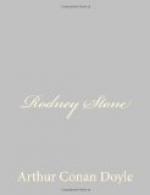“You are old enough to see things as they are, nephew,” said he, “and your knowledge of them is the badge that you are in that inner circle where I mean to place you. There is no one who knows the Prince better than I do, and there is no one who trusts him less. A stranger contradiction of qualities was never gathered under one hat. He is a man who is always in a hurry, and yet has never anything to do. He fusses about things with which he has no concern, and he neglects every obvious duty. He is generous to those who have no claim upon him, but he has ruined his tradesmen by refusing to pay his just debts. He is affectionate to casual acquaintances, but he dislikes his father, loathes his mother, and is not on speaking terms with his wife. He claims to be the first gentleman of England, but the gentlemen of England have responded by blackballing his friends at their clubs, and by warning him off from Newmarket under suspicion of having tampered with a horse. He spends his days in uttering noble sentiments, and contradicting them by ignoble actions. He tells stories of his own doings which are so grotesque that they can only be explained by the madness which runs in his blood. And yet, with all this, he can be courteous, dignified, and kindly upon occasion, and I have seen an impulsive good-heartedness in the man which has made me overlook faults which come mainly from his being placed in a position which no one upon this earth was ever less fitted to fill. But this is between ourselves, nephew; and now you will come with me and you will form an opinion for yourself.”
It was but a short walk, and yet it took us some time, for my uncle stalked along with great dignity, his lace-bordered handkerchief in one hand, and his cane with the clouded amber head dangling from the other. Every one that we met seemed to know him, and their hats flew from their heads as we passed. He took little notice of these greetings, save to give a nod to one, or to slightly raise his forefinger to another. It chanced, however, that as we turned into the Pavilion Grounds, we met a magnificent team of four coal-black horses, driven by a rough-looking, middle-aged fellow in an old weather-stained cape. There was nothing that I could see to distinguish him from any professional driver, save that he was chatting very freely with a dainty little woman who was perched on the box beside him.
“Halloa, Charlie! Good drive down?” he cried.
My uncle bowed and smiled to the lady.
“Broke it at Friar’s Oak,” said he. “I’ve my light curricle and two new mares—half thorough-bred, half Cleveland bay.”
“What d’you think of my team of blacks?” asked the other.
“Yes, Sir Charles, what d’you think of them? Ain’t they damnation smart?” cried the little woman.
“Plenty of power. Good horses for the Sussex clay. Too thick about the fetlocks for me. I like to travel.”




